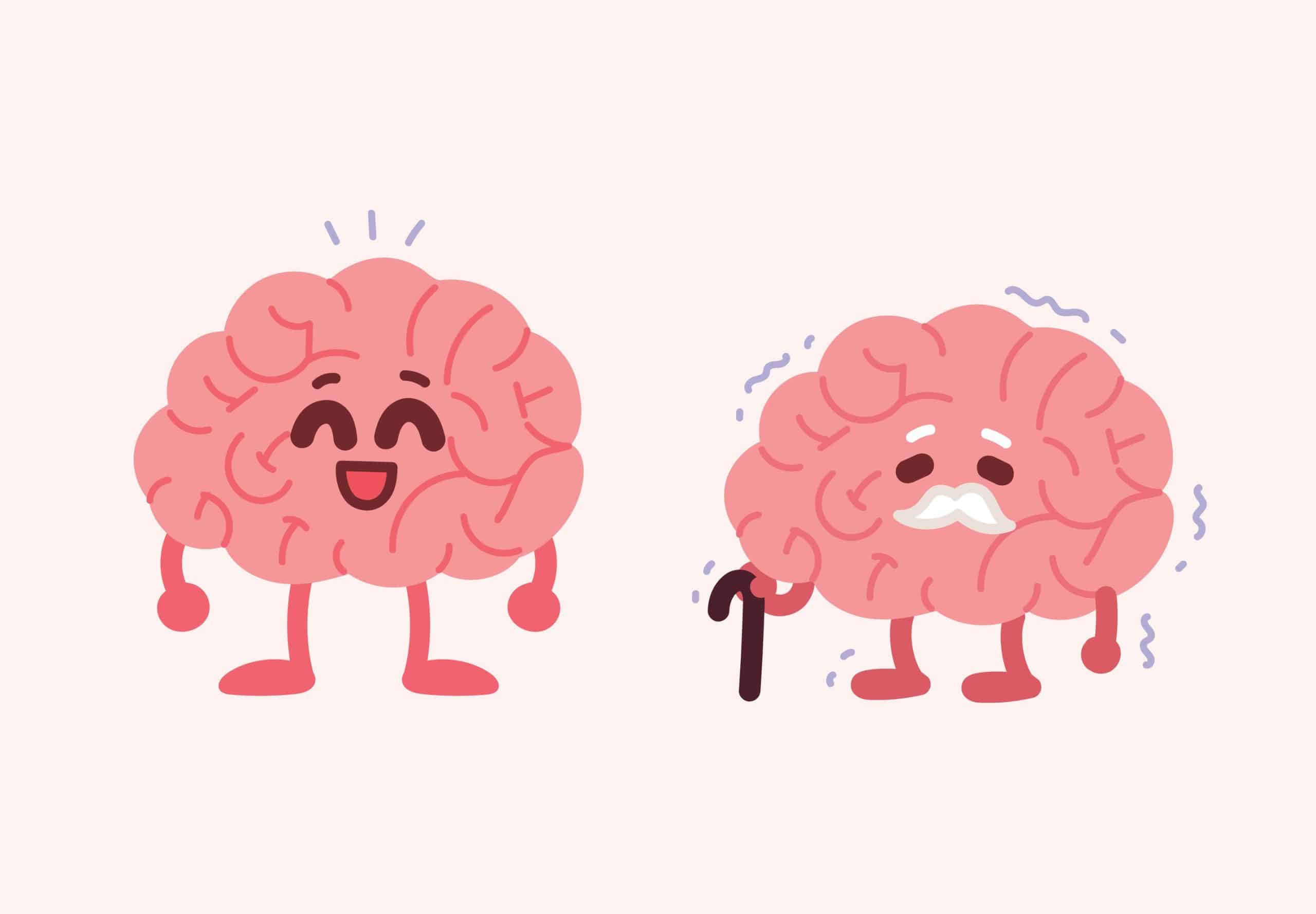Let’s explore how insulin resistance impacts the brain, the long-term consequences of poor insulin sensitivity, and what you can do to protect your brain health.
How Insulin Affects the Brain
Insulin isn’t just for regulating blood sugar—it’s also essential for healthy brain function. The brain relies on insulin for multiple processes, including:
- Regulating energy: Insulin helps brain cells absorb glucose, the primary source of energy for the brain.
- Supporting memory and learning: Insulin receptors are found in areas of the brain responsible for memory, such as the hippocampus.
- Promoting neuron growth and repair: Insulin supports the brain’s ability to regenerate and repair cells.
When insulin resistance occurs, the brain’s ability to use glucose efficiently is impaired. This lack of energy and support can lead to cognitive decline and increase the risk of neurodegenerative diseases like Alzheimer’s.
Insulin Resistance and Brain Aging

A recent study revealed a sobering fact: 10 years of insulin resistance can age the brain by an additional 2 years compared to someone of the same age with healthy insulin sensitivity. This accelerated aging has significant consequences for memory, learning, and cognitive function.
Here’s how prolonged insulin resistance affects the brain:
- Impaired memory: Insulin resistance disrupts the brain’s ability to store and retrieve memories, affecting both short-term and long-term recall.
- Reduced learning ability: The brain becomes less responsive to signals that support learning and adaptation.
- Increased brain inflammation: Insulin resistance contributes to inflammation, which can damage neurons and interfere with normal brain activity.
- Higher risk of neurodegenerative diseases: Conditions like Alzheimer’s, often referred to as “type 3 diabetes,” are strongly linked to prolonged insulin resistance.
Insulin Resistance, Overeating, and Weight Gain

Insulin resistance can also alter behavior, particularly around food. When the brain becomes less responsive to insulin, the signals that regulate appetite and fullness are disrupted. This often leads to:
- Increased hunger: The brain struggles to recognize when the body has had enough to eat.
- Cravings for high-calorie foods: Insulin resistance can amplify cravings for sugary or carb-heavy foods, further exacerbating the issue.
- Weight gain: Overeating, combined with the body’s inability to burn fat effectively, leads to an accumulation of excess weight—especially around the belly.
This vicious cycle of overeating and weight gain not only worsens insulin resistance but also contributes to further brain dysfunction.
The Long-Term Implications for Independence

Maintaining cognitive health is essential for living independently as we age. Insulin resistance poses a threat to this goal by impairing the brain’s ability to function properly over time.
- Loss of memory: Difficulty remembering names, faces, or even basic tasks can make it challenging to navigate daily life.
- Reduced decision-making skills: Insulin resistance affects the brain’s frontal lobe, which is responsible for planning and decision-making.
- Increased dependency on others: As brain health deteriorates, individuals may require more assistance with daily tasks, reducing their independence.
By addressing insulin resistance early, you can help preserve your brain’s health and support your ability to live independently for as long as possible.
How to Improve Insulin Sensitivity Naturally

The good news is that insulin resistance can often be reversed with the right lifestyle changes. Here’s how you can take action to protect your brain health:
1. Adopt a Low-Carb Diet
Reducing your intake of processed carbs and sugars can stabilize blood sugar levels and improve insulin sensitivity. Focus on nutrient-dense foods like vegetables, lean proteins, and healthy fats.
2. Incorporate Regular Exercise
Physical activity improves how your cells respond to insulin. Both aerobic exercises (like walking or cycling) and strength training can have a positive impact.
3. Prioritize Sleep
Sleep is essential for hormone regulation, including insulin. Aim for 7–9 hours of quality sleep each night to support your body’s natural repair processes.
4. Manage Stress Levels
Chronic stress raises cortisol, which can worsen insulin resistance. Practices like meditation, yoga, or deep breathing can help lower stress and improve insulin sensitivity.
5. Stay Hydrated
Dehydration can impair the body’s ability to use insulin effectively. Ensure you’re drinking enough water daily to support overall metabolic health.
6. Intermittent Fasting
One of the most effective strategies to combat insulin resistance is intermittent fasting. This simple, sustainable approach helps regulate blood sugar levels, boost metabolism, and promote fat burning—all while supporting overall health.
If you’re curious about how to get started, I’ve created a blog series dedicated to intermittent fasting. You can check out my series here.
Why Acting Now Matters

The connection between insulin resistance and brain health has critical implications for your long-term well-being. Addressing insulin resistance isn’t just about preventing diabetes—it’s about preserving your memory, cognitive function, and independence as you age.
If you want to protect your brain and live your life to its fullest potential, taking steps to improve insulin sensitivity today can make all the difference.
Final Thoughts

Your brain health and insulin sensitivity are more closely linked than you might think. Prolonged insulin resistance not only ages the brain but also compromises memory, learning, and decision-making abilities. By addressing insulin resistance now, you’re taking a proactive step toward safeguarding your cognitive health, maintaining independence, and living your best life.
Don’t wait—start making changes today to protect your brain for tomorrow.
Spread the Word: Let’s Empower Our Community

As you continue reading upcoming articles, I encourage you to share this website with friends, family, and colleagues in our community who could benefit from these insights. By spreading the word, you help build a supportive network dedicated to uplifting the health and well-being of our community.
Visit my website to explore more articles and resources designed to offer practical advice for improving health. Your support helps create a space where we can unite in pursuing better health, self-care, and a stronger community.
Want to stay updated on the latest health topics, tips, and upcoming blogs? Subscribe to my email list and never miss out on valuable insights that can help you and your loved ones on your wellness journey.
Together, let’s uplift one another. Share and explore the available resources, subscribe for updates, and join me in the journey toward a healthier, more empowered community.
Your Thoughts Matter

Thank you for taking the time to read this blog. I hope it resonated with you and provided meaningful insights into the health challenges many in our community face. I’d love to hear your thoughts—what obstacles do you encounter, and what strategies have helped you? If there’s a particular aspect of health or wellness you’d like me to explore in future posts, please share your ideas. Your feedback is invaluable and helps me focus on what matters most to you. Let’s keep this conversation going and support one another on the path to better health!
Who is Arnold Brown?

Raised in Louisiana, Arnold Brown graduated from Louisiana State University with a bachelor’s degree majoring in Spanish and minoring in Mandarin Chinese. Upon graduation, Arnold accepted the opportunity to live for two years in China, where he taught English as a Second Language at the University of Ningxia. Being the only African American male in the city where he lived, Arnold describes his experience as absolutely life-changing. Arnold speaks 4 languages fluently, English, Spanish, Portuguese, and Mandarin Chinese. Arnold currently teaches Spanish classes online, tutors, and also has very own self-paced Spanish learning online program. If you would like to learn more about Arnold’s background, click here.
Arnold Lost 63 Lbs in 18 Weeks
Having undergone a profound transformation in 2020, Arnold also discovered a deep passion for health and wellness, and now dedicates himself to teaching the same principles that transformed my life, especially within the community. As a certified personal trainer, nutritionist, bodybuilding specialist, and youth fitness instructor, learn how Arnold lost 63 lbs in 18 weeks by reading his story here.

